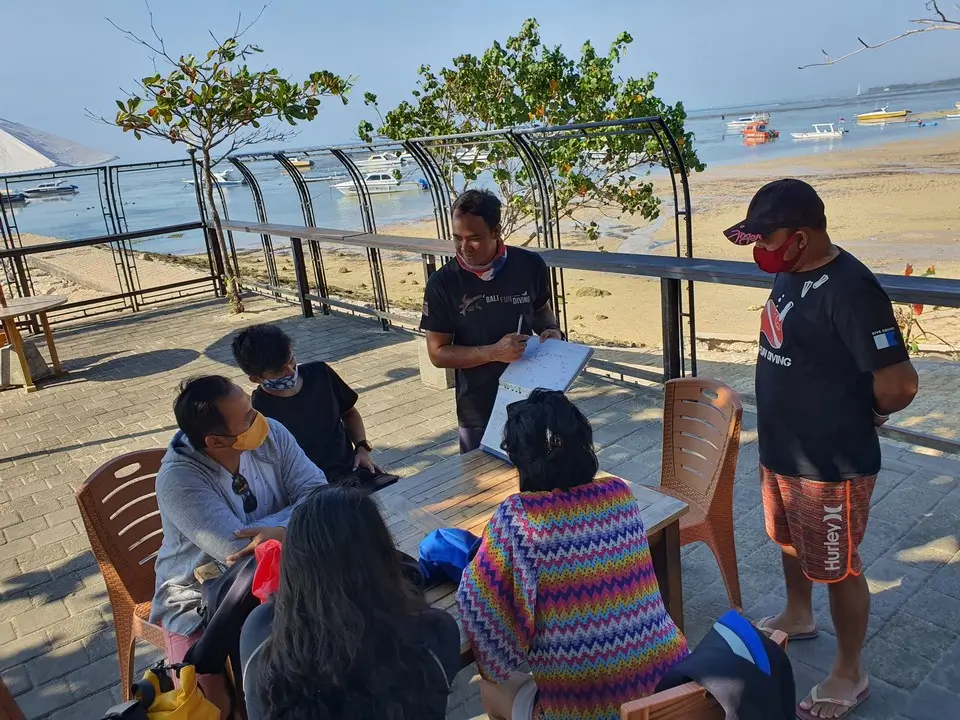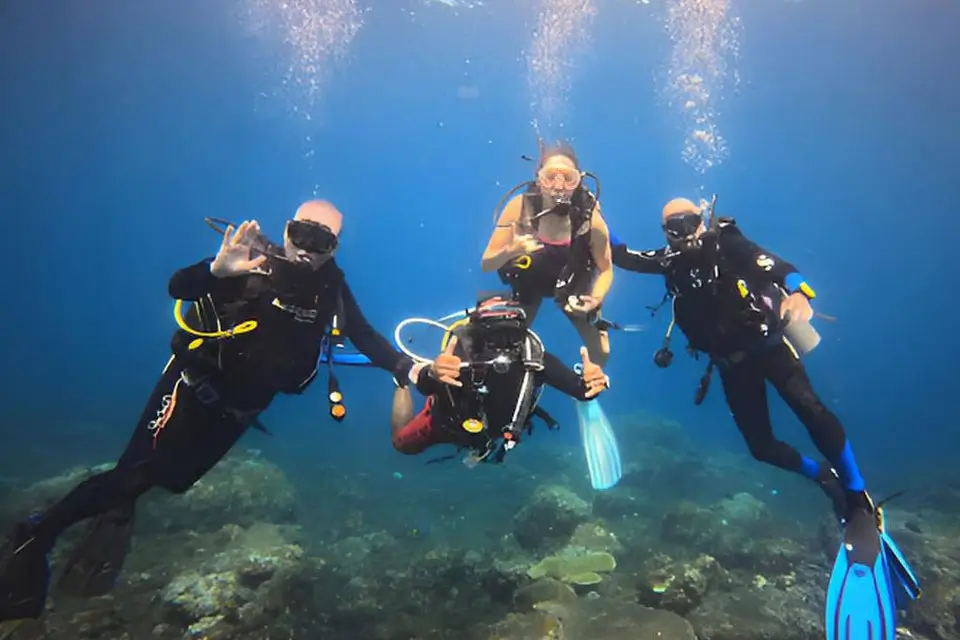
Every diver, beginner or experienced, can make mistakes. For beginners, it’s often about learning how to manage nerves, control buoyancy, and remember basic skills underwater. For experienced divers, it’s usually about becoming too comfortable and skipping small but important habits.
No matter your level, diving requires awareness every time you enter the water. The ocean is always changing. Currents, visibility, and even your own energy levels can affect how you dive. When you treat every dive as a learning experience, you stay sharp and confident. The truth is, no one ever stops learning underwater. Good divers keep improving by paying attention to details, practicing good habits, and respecting every dive.
Common Diving Mistakes and How to Avoid Them
Below are some of the most common diving mistakes that even experienced divers still make and how to avoid them.
Pushing Beyond Comfort and Training

Diving beyond your comfort and training limits often starts with excitement. You want to see what is deeper, swim through stronger currents, or follow a group to a site that looks amazing. It feels harmless until something unexpected happens.
In Bali, dive sites like Nusa Penida or Crystal Bay can shift from calm to challenging in minutes. When that happens, skill and control matter more than bravery. Staying within your limits is not about fear; it is about respect for the ocean, your training, and yourself.
The best way to avoid this mistake is to stay honest about your comfort zone. If you feel unsure, speak up before the dive and ask for advice or guidance. There is nothing wrong with staying within your level, because diving safely allows you to keep learning, improving, and enjoying every dive without unnecessary risk.
Skipping the Simple Checks

Skipping the simple checks before a dive often comes from habit. Divers who have done it many times might feel there is no need to test everything again. But diving is unpredictable, and even a small issue like a loose hose or half-empty tank can cause stress once you are underwater. Checking your gear and your buddy should never feel optional. It is the first step toward a calm and safe dive.
Before every dive, take a moment to check:
- Air supply to make sure your tank is full and valve is open
- Inflator hose and BCD for proper function
- Weights and straps to ensure they are secure and balanced
- Mask and fins for comfort and fit
- Hand signals with your buddy for clear communication
Equalizing Too Late or Forcing It

Equalizing too late or forcing it happens more often than divers admit. Many rush the descent or assume their ears will adjust automatically, only to feel pain halfway down. It is a simple mistake that can lead to discomfort or even injury if ignored. Equalizing is not just about pressure; it is about patience and paying attention to what your body tells you.
Avoiding this is easy if you start early. Equalize gently before you feel pressure, and keep doing it slowly as you go down. If your ears do not clear, stop for a moment, go a little higher, and try again. Diving should never hurt. The more relaxed and patient you are, the smoother your descent will be.
Lack of Buoyancy Control

Lack of buoyancy control is one of the most common diving mistakes, even among experienced divers. It is not always about poor skill; sometimes it comes from being overweighted, rushing a descent, or breathing unevenly. You might find yourself drifting too high or sinking too close to the bottom without realizing it. Small changes in your breathing or movement can affect your balance more than you expect.
To avoid this, start by checking your weights carefully before the dive and relax your breathing once you are underwater. Move slowly, keep your hands close to your body, and let your lungs do most of the work. Practicing neutral buoyancy often is the best way to make diving smoother and more enjoyable. The better your control, the more confident and comfortable you will feel underwater.
Not Focusing During the Dive Briefing

Not focusing during the dive briefing is something many divers are guilty of, especially when they already know the site or feel confident from previous dives. It is easy to drift off, chat with your buddy, or assume you already know what the guide will say. But the briefing is there for a reason. It includes small but important details like current direction, depth limits, entry and exit points, and any changes that may have happened since your last visit. Even a dive site you know well can feel completely different from one day to the next.
To avoid this mistake, give the briefing your full attention. Stay present, listen carefully, and take a moment to picture the dive plan in your mind. Ask questions if something sounds unclear and make sure you and your buddy agree on what to do underwater. A few minutes of focus before the dive can prevent confusion, stress, and wasted air later on.
Poor Buddy Communication

Poor buddy communication is one of the easiest mistakes to make underwater. Many divers feel comfortable with their buddy and assume everything will be fine, but comfort can lead to silence. When you stop signaling, stop checking, or drift too far apart, small problems can quickly grow into big ones. Good communication is not only about hand signals; it is about staying aware of each other’s position and reactions throughout the dive.
To avoid this mistake, make communication a habit. Review hand signals before entering the water and agree on simple ones for depth, direction, or air checks. Stay close enough to keep eye contact and check in often, even when everything feels fine. Diving is safer and far more enjoyable when both buddies move as one team, not two separate divers.
Doing Too Much Underwater

Doing too much underwater is a mistake that often starts with excitement. Many divers try to take photos, chase fish, fix their gear, or multitask while swimming. It might feel productive, but it divides your focus and increases air use, fatigue, and risk. Diving should be simple. The less you try to do at once, the more you notice and enjoy.
To avoid this, slow down and make your dives about awareness, not activity. Pick one main goal for each dive, whether it is to practice buoyancy, enjoy marine life, or take a few photos. Staying calm and focused will help you use less air and see more of the underwater world around you.
Not Being Proactive with Questions

Not being proactive with questions is something many divers fall into, often without realizing it. Some stay quiet because they feel shy, while others believe they already know enough. Yet every dive site is different, and conditions can change from one day to the next. A quick question before diving can clear doubts, prevent stress, and make the dive safer for everyone.
To be more proactive, take a moment to engage with your instructor or guide before you dive. Ask about the current, visibility, possible marine life, or anything that feels unclear. Being curious shows that you care about safety and the quality of your experience. The divers who ask questions are usually the ones who improve the fastest and enjoy the most.
Not Taking Personal Responsibility

Not taking personal responsibility for your dive is an easy trap to fall into, especially when diving with a group or a trusted guide. It can lead to a mindset of relying too much on others for safety or navigation. Every diver should understand their limits, gear, and surroundings, no matter how experienced the guide may be.
To avoid this, take ownership of your dive preparation. Check your own equipment, know your air level, and pay attention to your location throughout the dive. Being responsible does not mean being alone; it means being a reliable part of your team. Diving is safest when everyone takes care of themselves and looks out for each other.
Choosing the Wrong Dive Destination

Choosing the wrong dive destination can make your experience uncomfortable or even risky. Some divers pick a site because it looks beautiful online or because others recommend it, without checking if it matches their skill level. Not all dive sites are suitable for every diver, especially in Bali, where conditions can change quickly between areas like Amed, Tulamben, and Nusa Penida.
To avoid this mistake, do some research or ask your dive center for honest advice. Consider factors like current strength, depth, visibility, and your own comfort level. A dive that matches your ability will always be more enjoyable than one that feels forced. The best dive is not always the deepest or most famous one, it is the one that leaves you smiling when you surface.
Good Habits Create Great Divers
Every diver, no matter how experienced, can still make common diving mistakes. What matters most is staying aware and open to improvement. Diving is not about perfection but about learning, patience, and respect for the ocean. When you slow down, check your gear, and stay mindful underwater, every dive becomes safer, easier, and more rewarding. At Bali Fun Diving, we believe that good habits and calm awareness are what turn ordinary dives into unforgettable experiences. Dive safe, dive smart, and keep growing with every dive you take.
Share this Article